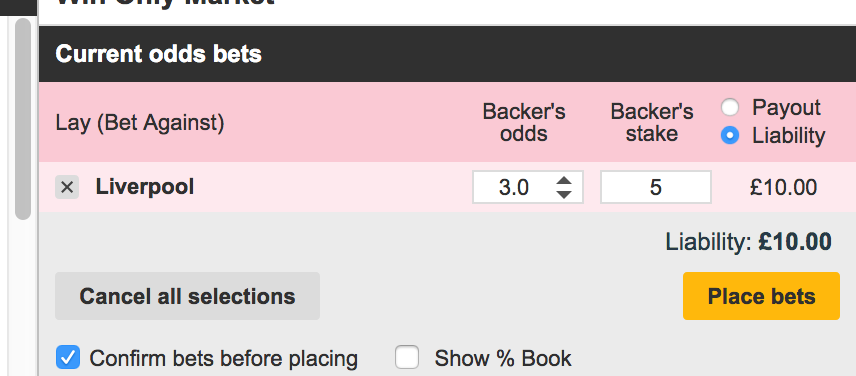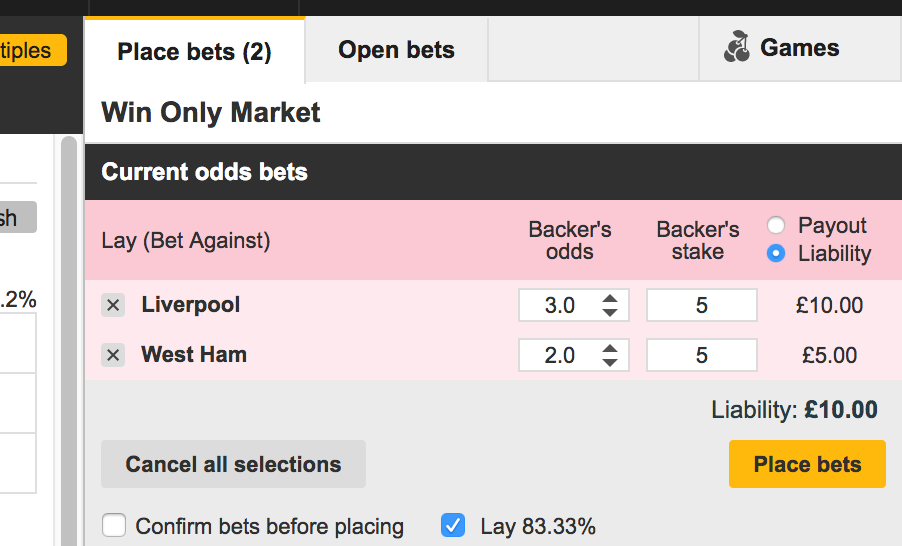The Facts about Combining Liability
You may see the term combining liability used in matched betting. The phrase combined liability is also sometimes used. This is well worth finding out about, as it is something that works to your advantage.
You are likely to notice it when money is removed from your balance on an exchange. This happens after placing lay bets but it might not be the amount you expected. Don’t worry though, as it’s a good thing rather than a problem.
What does all this mean and is it important? Let’s start at the beginning and see what it is all about.
The Basics
To start with, the liability is the amount that you could lose. If your bet doesn’t win then this is what you will lose. With back bets this is easy to calculate. It is simply the amount that you stake on the outcome.
So, a £5 bet with a bookie is a £5 liability. There is no way that you could be liable for more money. No matter happens, you can’t lose more than £5 on the bet. Imagine the chaos is you could lose more than your stake with the bookies. It just can’t happen.
So far, it is very easy to understand. The higher your stake on the back bet, the bigger your liability. But what about the liability in lay bets. This is where things get a bit trickier.
Remember that on a betting exchange you are acting as the bookmaker. This means that you still have a stake. But you also have a liability as well.
The stake on a lay bet is the amount you can win. On the other hand, the liability is how much you can lose. So, you either win the stake or lose the liability.
This can add up to a lot of money. If you are placing several lay bets it can mean a lot of liability. This could be a problem for some people. Thankfully, this is where combining liability can help you out.
An Example
As always, an example can help to make this clearer. Let’s say that you are you placing a lay bet on Liverpool. To keep it simple, the bet is for £5. The odds are 3.0, which translates as 2/1 if you prefer. In this case, the liability is easy to work out – it is £10.

Some people find it easier to think of themselves as the bookie. This means that the lay stake is the same as the bet made by a punter. If Liverpool win, you need to pay out the liability. If they don’t win, you get to pocket the stake.
With the example we just looked at, a punter bets £5. If their bet loses then you win their £5. If they win then you lose the £10 you need to pay out. It is quite a simplistic way to look at it. But it could be useful for understanding the subject better.
The liability for a single bet is easy to see. The big question is how much this liability could reach on different bets. You might think that you add them all up. That would make a tidy sum. Is this true, though?
What Is Combined Liability?
We have now seen what liability is. The next question concerns combined liability. What does this add to what we have already looked at?
Basically, combined liability involves more than one lay bet. You don’t need to add the liability all together. Well, in certain cases you don’t need to.
These bets need to be made in the same market. If that is the case, we can combine the liability from all of the bets together. Your combined liability will be overall maximum that you could lose. This isn’t the same as adding them all together.
If they are not in the same market then this doesn’t apply. In this case, the individual liabilities are just added up.
Again, looking at yourself as a bookie can help. If you have five punters all betting on different winners how much can you lose? Only one of them can win the bet. The others are all going to lose. So there is no chance of your liability being the total of all of the liabilities.
The amount you could lose or win will vary. This depends upon who actually wins. Since the odds are all different, each one has a different liability. Overall though, there is a maximum you could lose. This is the worst case scenario and is your combined liability.
An Example
This is a bit more complicated to work through than a single lay bet. Another example will help us to see it more clearly. The earlier example was for Liverpool. We can now say that it was for Liverpool vs West Ham.
Let’s list all of the possible outcomes.
- We made a £5 lay bet on Liverpool at 3.0 odds. This gives us a liability of £10. If they win we pay out this amount. If they lose, we win the £5.
- In addition, we also placed a £5 lay bet on West Ham. The odds in this case were 2.0. So, we have an extra liability here of £5. This is what we pay if they win. If they lose, the £5 is ours.
Both lay bets add up to £15 in liability. In other words, if both teams won then you would need to pay £15. This means that you would need to have the full £15 taken from your account. This would cover you for losing both bets, a £10 liability and a £5 liability.
However, we know that this is impossible. There is simply no situation in which you would need £15. In this example we are looking at the same game. Liverpool and Spurs can’t both win the same match. So, it is impossible for you to lose both bets.
All you need is the liability of the highest odds selection providing you are staking the same amount.

By combining liability, the most we can possibly lose is £10. Therefore, it is £10 that will be taken out of your account. There is no need for the exchange to deduct more than this.
Does the Order of the Bets Matter?
So far so good, but there is a point to remember when combining liability. This is the order that you place the lay bets in. Is it important for any particular reason? We need to work through the example again to find this out.
We need to go back to the example of Liverpool vs West Ham for this. As we have seen, the combined liability is just £10. This is how much needs to be deducted from your account. Yet, what happens when you place the bets in different orders?
Well, you might place the lay bet on Liverpool first of all. In this situation, the liability is £10. This means that this amount will be taken off right away. You have now had more deducted than the combined liability.
When you then place the West Ham lay bet, the liability does not increase. This is because you are now combining liability on related bets. The good news is that the exchange takes this into account.
On the other hand, you might place the West Ham bet first. This has a liability of £5, which will be deducted right away. When you place the Liverpool bet, a further £5 lay liability will be taken.
The end result is the same in both cases.
A Look at Combining Liability in Horse Racing
While the first example was for football, it can also apply in other sports. Horse racing is a good example of this. You might use a matched betting tool to find several bets in one race. This is a great way to earn risk-free bets.
However, it means putting on a number of lay bets. Combined liability makes it easier for you do this.
Again, only one entrant can win a single race. So if you place lay bets on 3 or 4 horses then only of them can lose you money. This means that you are combining liability as in the football example. There is no need to add up all of the individual figures.
Here is an example of me submitting a lay bet on 5 separate horses. You will see I only need the liability to cover the selection with the highest odds – Centerfoldprospect – odds 7.0 and liability £30.

The process is exactly the same as with the football game we looked at. You can work out the liability for each bet. You then need to work out the combined liability by seeing the maximum you could lose. This is how much will be deducted from your account by the betting exchange.
Combining liability is more important in horse racing than in football. This is due to the number of possible outcomes. Adding up all of the individual liabilities can lead to a big figure. Yet, the combined figure is likely to be a lot lower.
Other Types of Bet
The concept of combining liability works in other markets too. Let’s imagine that you are looking at the top scorer in a football tournament. Or at the winner of a tennis match. Or the team to win a cricket match. As long as you are betting on related outcomes, this applies.
As we have seen, it is more important when you place several lay bets. If there is only one possible eventual outcome, this will keep the final liability low. It is always worth considering this before going ahead with a bet.
Having said that, it only works where there can be a single winner. If more than one bet can win then combining liability doesn’t help you. Therefore, stick to markets where only one entrant can eventually win.
The Advantage of Combining Liability
There are some reasons why combining liability is good news for matched bettors. The first is that you don’t tie up your funds as much. If we look at the example of the horse race this is a good example. The combined liability is going to be a lot lower than the total of the individual bets.
This is especially true if you put on a lot of bets. Without combining liability, it could add up to more than you have available. It is important for bettors who are just starting out. If you have a small bank this can open up more opportunities for you.
This means that it is a way of using your funds more smartly. You can cover a range of outcomes with less risk. So there is a better chance of building up funds quickly.
It also means that you can use your bank for more offers. Rather than tying up too much on one bet, you spread it around. This can let you take advantage of more offers. It also means that you aren’t waiting around for results to place more bets.
This is especially important if you have a lot of small wins. This type of approach means that the volume of bets is vital. The more bets that you place, the more you win.
Summary
The subject of combining liability is well worth knowing about. This is something that directly affects how you use your bank.
Best of all, it is done automatically by the exchange. You just need to place your lays bets and the liability will be combined automatically. All you need to do is be aware of how it affects you. Above all, bet on the same game or event if you want to take advantage.


What happens if joint favourites win? Can you have 2 winners to lose a lay bet?
What about if it is a dead heat?